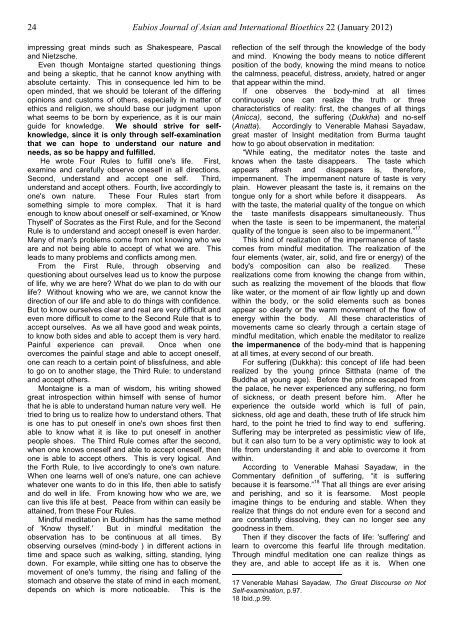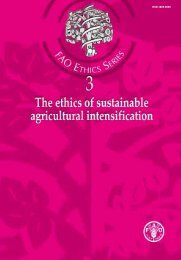Eubios Journal of Asian and International Bioethics - Eubios Ethics ...
Eubios Journal of Asian and International Bioethics - Eubios Ethics ...
Eubios Journal of Asian and International Bioethics - Eubios Ethics ...
Create successful ePaper yourself
Turn your PDF publications into a flip-book with our unique Google optimized e-Paper software.
24 <strong>Eubios</strong> <strong>Journal</strong> <strong>of</strong> <strong>Asian</strong> <strong>and</strong> <strong>International</strong> <strong>Bioethics</strong> 22 (January 2012)<br />
impressing great minds such as Shakespeare, Pascal<br />
<strong>and</strong> Nietzsche.<br />
Even though Montaigne started questioning things<br />
<strong>and</strong> being a skeptic, that he cannot know anything with<br />
absolute certainty. This in consequence led him to be<br />
open minded, that we should be tolerant <strong>of</strong> the differing<br />
opinions <strong>and</strong> customs <strong>of</strong> others, especially in matter <strong>of</strong><br />
ethics <strong>and</strong> religion, we should base our judgment upon<br />
what seems to be born by experience, as it is our main<br />
guide for knowledge. We should strive for selfknowledge,<br />
since it is only through self-examination<br />
that we can hope to underst<strong>and</strong> our nature <strong>and</strong><br />
needs, as so be happy <strong>and</strong> fulfilled.<br />
He wrote Four Rules to fulfill one's life. First,<br />
examine <strong>and</strong> carefully observe oneself in all directions.<br />
Second, underst<strong>and</strong> <strong>and</strong> accept one self. Third,<br />
underst<strong>and</strong> <strong>and</strong> accept others. Fourth, live accordingly to<br />
one's own nature. These Four Rules start from<br />
something simple to more complex. That it is hard<br />
enough to know about oneself or self-examined, or 'Know<br />
Thyself' <strong>of</strong> Socrates as the First Rule, <strong>and</strong> for the Second<br />
Rule is to underst<strong>and</strong> <strong>and</strong> accept oneself is even harder.<br />
Many <strong>of</strong> man's problems come from not knowing who we<br />
are <strong>and</strong> not being able to accept <strong>of</strong> what we are. This<br />
leads to many problems <strong>and</strong> conflicts among men.<br />
From the First Rule, through observing <strong>and</strong><br />
questioning about ourselves lead us to know the purpose<br />
<strong>of</strong> life, why we are here? What do we plan to do with our<br />
life? Without knowing who we are, we cannot know the<br />
direction <strong>of</strong> our life <strong>and</strong> able to do things with confidence.<br />
But to know ourselves clear <strong>and</strong> real are very difficult <strong>and</strong><br />
even more difficult to come to the Second Rule that is to<br />
accept ourselves. As we all have good <strong>and</strong> weak points,<br />
to know both sides <strong>and</strong> able to accept them is very hard.<br />
Painful experience can prevail. Once when one<br />
overcomes the painful stage <strong>and</strong> able to accept oneself,<br />
one can reach to a certain point <strong>of</strong> blissfulness, <strong>and</strong> able<br />
to go on to another stage, the Third Rule: to underst<strong>and</strong><br />
<strong>and</strong> accept others.<br />
Montaigne is a man <strong>of</strong> wisdom, his writing showed<br />
great introspection within himself with sense <strong>of</strong> humor<br />
that he is able to underst<strong>and</strong> human nature very well. He<br />
tried to bring us to realize how to underst<strong>and</strong> others. That<br />
is one has to put oneself in one's own shoes first then<br />
able to know what it is like to put oneself in another<br />
people shoes. The Third Rule comes after the second,<br />
when one knows oneself <strong>and</strong> able to accept oneself, then<br />
one is able to accept others. This is very logical. And<br />
the Forth Rule, to live accordingly to one's own nature.<br />
When one learns well <strong>of</strong> one's nature, one can achieve<br />
whatever one wants to do in this life, then able to satisfy<br />
<strong>and</strong> do well in life. From knowing how who we are, we<br />
can live this life at best. Peace from within can easily be<br />
attained, from these Four Rules.<br />
Mindful meditation in Buddhism has the same method<br />
<strong>of</strong> 'Know thyself.' But in mindful meditation the<br />
observation has to be continuous at all times. By<br />
observing ourselves (mind-body ) in different actions in<br />
time <strong>and</strong> space such as walking, sitting, st<strong>and</strong>ing, lying<br />
down. For example, while sitting one has to observe the<br />
movement <strong>of</strong> one's tummy, the rising <strong>and</strong> falling <strong>of</strong> the<br />
stomach <strong>and</strong> observe the state <strong>of</strong> mind in each moment,<br />
depends on which is more noticeable. This is the<br />
reflection <strong>of</strong> the self through the knowledge <strong>of</strong> the body<br />
<strong>and</strong> mind. Knowing the body means to notice different<br />
position <strong>of</strong> the body, knowing the mind means to notice<br />
the calmness, peaceful, distress, anxiety, hatred or anger<br />
that appear within the mind.<br />
If one observes the body-mind at all times<br />
continuously one can realize the truth or three<br />
characteristics <strong>of</strong> reality: first, the changes <strong>of</strong> all things<br />
(Anicca), second, the suffering (Dukkha) <strong>and</strong> no-self<br />
(Anatta). Accordingly to Venerable Mahasi Sayadaw,<br />
great master <strong>of</strong> Insight meditation from Burma taught<br />
how to go about observation in meditation:<br />
“While eating, the meditator notes the taste <strong>and</strong><br />
knows when the taste disappears. The taste which<br />
appears afresh <strong>and</strong> disappears is, therefore,<br />
impermanent. The impermanent nature <strong>of</strong> taste is very<br />
plain. However pleasant the taste is, it remains on the<br />
tongue only for a short while before it disappears. As<br />
with the taste, the material quality <strong>of</strong> the tongue on which<br />
the taste manifests disappears simultaneously. Thus<br />
when the taste is seen to be impermanent, the material<br />
quality <strong>of</strong> the tongue is seen also to be impermanent.” 17<br />
This kind <strong>of</strong> realization <strong>of</strong> the impermanence <strong>of</strong> taste<br />
comes from mindful meditation. The realization <strong>of</strong> the<br />
four elements (water, air, solid, <strong>and</strong> fire or energy) <strong>of</strong> the<br />
body's composition can also be realized. These<br />
realizations come from knowing the change from within,<br />
such as realizing the movement <strong>of</strong> the bloods that flow<br />
like water, or the moment <strong>of</strong> air flow lightly up <strong>and</strong> down<br />
within the body, or the solid elements such as bones<br />
appear so clearly or the warm movement <strong>of</strong> the flow <strong>of</strong><br />
energy within the body. All these characteristics <strong>of</strong><br />
movements came so clearly through a certain stage <strong>of</strong><br />
mindful meditation, which enable the meditator to realize<br />
the impermanence <strong>of</strong> the body-mind that is happening<br />
at all times, at every second <strong>of</strong> our breath.<br />
For suffering (Dukkha): this concept <strong>of</strong> life had been<br />
realized by the young prince Sitthata (name <strong>of</strong> the<br />
Buddha at young age). Before the prince escaped from<br />
the palace, he never experienced any suffering, no form<br />
<strong>of</strong> sickness, or death present before him. After he<br />
experience the outside world which is full <strong>of</strong> pain,<br />
sickness, old age <strong>and</strong> death, these truth <strong>of</strong> life struck him<br />
hard, to the point he tried to find way to end suffering.<br />
Suffering may be interpreted as pessimistic view <strong>of</strong> life,<br />
but it can also turn to be a very optimistic way to look at<br />
life from underst<strong>and</strong>ing it <strong>and</strong> able to overcome it from<br />
within.<br />
According to Venerable Mahasi Sayadaw, in the<br />
Commentary definition <strong>of</strong> suffering, “it is suffering<br />
because it is fearsome.” 18 That all things are ever arising<br />
<strong>and</strong> perishing, <strong>and</strong> so it is fearsome. Most people<br />
imagine things to be enduring <strong>and</strong> stable. When they<br />
realize that things do not endure even for a second <strong>and</strong><br />
are constantly dissolving, they can no longer see any<br />
goodness in them.<br />
Then if they discover the facts <strong>of</strong> life: 'suffering' <strong>and</strong><br />
learn to overcome this fearful life through meditation.<br />
Through mindful meditation one can realize things as<br />
they are, <strong>and</strong> able to accept life as it is. When one<br />
17 Venerable Mahasi Sayadaw, The Great Discourse on Not<br />
Self-examination, p.97.<br />
18 Ibid.,p.99.

















